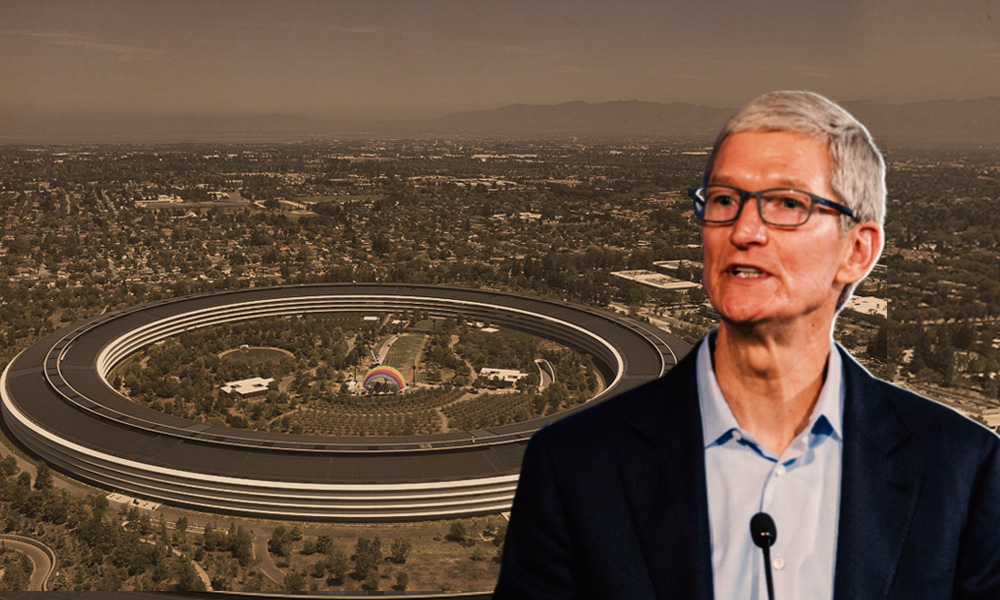
Image Credits: Wikimedia
Tech Giant Apple Pledges To Be Fully Carbon-Neutral By 2030
Writer: Reethu Ravi
Reethu, a story teller, a person often found between the pages of a book or contemplating the nuances of life.
India, 22 July 2020 2:28 PM GMT | Updated 23 July 2020 5:17 AM GMT
Editor : Shubhendu Deshmukh |
Shubhendu, the quint essential news junky, the man who loves science and politics in equal measure and offers the complete contrast to it by being a fan of urdu poetry as well.
Creatives : Abhishek M
" An engineer by profession, Abhishek is the creative producer of the team, graphic designing is his passion and travelling his get away. In more ways than one, he makes the content visually appealing."
The company plans to cut emissions by 75 per cent by 2030, while developing innovative carbon removal solutions for the remaining 25 per cent of its footprint.
Tech giant Apple has announced a commitment to be 100 per cent carbon neutral across its entire business, manufacturing supply chain, and product life cycle by 2030.
The company said that the commitment means its devices will have had "zero climate impact" at point of sale.
Apple plans to cut emissions by 75 per cent by 2030 while developing innovative carbon removal solutions for the remaining 25 per cent of its footprint.
"Businesses have a profound opportunity to help build a more sustainable future, one born of our common concern for the planet we share," Tim Cook, Apple's CEO, said in a statement on Tuesday, July 21.
"The innovations powering our environmental journey are not only good for the planet — they've helped us make our products more energy-efficient and bring new sources of clean energy online around the world. Climate action can be the foundation for a new era of innovative potential, job creation, and durable economic growth. With our commitment to carbon neutrality, we hope to be a ripple in the pond that creates a much larger change," he added.
In its 2020 Environmental Progress Report, Apple detailed a 10-year roadmap that pointed out some of its plans to reduce emissions.
To support these efforts, the tech giant is also establishing an Impact Accelerator that will focus on investing in minority-owned businesses that drive positive outcomes in its supply chain and in communities that are disproportionately affected by environmental hazards.
The Accelerator comes as a part of the company's recently announced $100 million Racial Equity and Justice Initiative, focused on efforts that address education, economic equality, and criminal justice reform.
"We're proud of our environmental journey and the ambitious roadmap we have set for the future," said Lisa Jackson, Apple's vice president of Environment, Policy and Social Initiatives.
"Systemic racism and climate change are not separate issues, and they will not abide by separate solutions. We have a generational opportunity to help build a greener and more just economy, one where we develop whole new industries in the pursuit of giving the next generation a planet worth calling home," Jackson added.
Low Carbon Product Design
In its continued efforts to increase the use of low carbon and recycled materials in its products, the company will innovate in product recycling, and design products as energy-efficient as possible.
Its products released last year - iPhone, iPad, Mac, and Apple Watch - are made with recycled content. This includes the 100 per cent recycled rare earth elements in the iPhone Taptic Engine, which is a first for Apple and any smartphone.
The company has also introduced a new robot, nicknamed Dave, to recover materials from the vibrating Taptic Engine of devices that are returned for recycling.
"Once we have the engine removed [by another robot] Daisy, Dave will disassemble the engine itself and remove the rare-earth elements and the tungsten so that they can be reprocessed and put back into supply chains," Jackson told BBC.
In 2019, the company decreased its carbon footprint by 4.3 million metric tons through design and recycled content innovations in its products. In the past 11 years, the company has also reduced the average energy needed for production use by 73 per cent.
Expanding Energy Efficiency
To expand energy efficiency, the company will identify new ways to lower energy use at its corporate facilities. It will also help its supply chain to make the same transition.
In 2019, the company invested in energy efficiency upgrades to over 6.4 million square feet of new and existing buildings, lowering electricity needs by nearly one-fifth and saving the company $27 million.
Renewable Energy
For its operations, the company will remain on 100 per cent renewable energy.
Over 70 of the company's suppliers had already committed to using 100 per cent renewable energy by 2030 for work on its products. Once completed, these commitments will avoid over 14.3 million metric tons of Carbon Dioxide emissions annually - the equivalent of taking more than 3 million cars off the road each year, the company said.
"Some of the investment we're making is to work with suppliers to convince their own governments to put more clean energy on the grid," Jackson said.
Among many steps toward using renewable energy, the company is also launching one of the largest new solar arrays in Scandinavia and two new projects providing power to underserved communities in the Philippines and Thailand.
Process And Material Innovations
In order to tackle emissions, the company will make technological improvements to the processes and materials needed for its products.
Through investments and collaboration with two of its aluminium suppliers, the company is supporting the development of the first-ever direct carbon-free aluminium smelting process.
"Through partnerships with its suppliers, Apple reduced emissions from fluorinated gases by more than 242,000 metric tons in 2019. Fluorinated gases are used in the manufacturing of some consumer electronics components and can contribute to global warming," the company said.
Carbon Removal
To remove carbon from the atmosphere, Apple is investing in forests and other nature-based solutions around the world. On Tuesday, the company also announced a first-of-its-kind carbon solutions fund to invest in the restoration and protection of forests and natural ecosystems across the globe.
Meanwhile, the company will invest in new projects in partnership with Conservation International. The company has protected and improved the management of over 1 million acres of forests and natural climate solutions in China, the US, Colombia, and Kenya, through its work with The Conservation Fund, the World Wildlife Fund, and Conservation International.
Earlier in January, Microsoft had announced a plan to become carbon negative by 2030 and a goal of erasing all of its historical emissions by 2050.
When a business aims to be carbon neutral, it is aiming to effectively add no carbon to the atmosphere. Whereas, to be carbon negative, a company must remove more greenhouse gases from the atmosphere than it emits.
Also Read: Maharashtra To Get More Clean Energy Through 602 MW Solar Power Projects
 All section
All section














